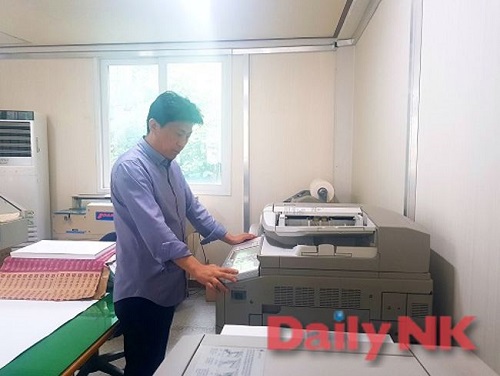
Lee In Ho (pictured above) is a North Korean defector who started his own business called Print and Copy Support over two years ago. Mr Lee’s hometown is Hyesan City, Ryanggang Province, and running a successful business is a huge accomplishment for him. He first arrived in South Korea to begin his new life in 2010. After drifting between jobs, Mr. Lee resolved to start his own business, which he has now successfully managed for the past two years. Last year, the Unification Ministry designated Mr. Lee’s business a “unification-oriented social enterprise,” deeming Print and Copy Support a model company for providing jobs to defectors and contributing to social harmony.
When he first established the shop, Mr. Lee worked tirelessly to get the processes up and running. Over time, he won a diverse range of contracts with government agencies, NGOs, and research institutions. Although Mr. Lee is a defector and was initially unfamiliar with all the technology required to smoothly run a print and copy business, his hard-earned reputation sees him now competing with the more well-established shops. Because of his work ethic and professionalism, he has retained a loyal following. In his second year of business, he achieved 100 million won (approximately $90,000) in sales. This year, Mr. Lee aims to expand his operations so that he can provide more jobs for defectors. Because he has gone through the process himself, he knows how difficult it can be for defectors to find stable work.
Mr. Lee was only able to accomplish his dream of starting a business thanks to a chance encounter with a South Korean citizen. He met an owner of a print shop in Chungmuro, and was able to spend a year learning book-binding, laminating, and printing techniques. Every time Mr. Lee made a mistake, the boss would yell at him saying things like: “You’ll never succeed if you’re lazy!” and, “Why can’t you concentrate?”
Enduring this tough treatment for a year, Mr. Lee eventually got up to speed. One day, the boss said to him: “Everyone can see that you’ve become a businessman. I’ll support you for three years and teach you everything. Learn diligently.” Following his advice, Mr. Lee spent three years at the shop in relative freedom and comfort. He resolved to go into business, which was an intimidating prospect at the time. Mr. Lee remains in contact with the Chungmuro boss, who still revels in doling out advice about business and printing.
Humble beginnings
Mr. Lee will never forget the day he moved into his own house in South Korea. He didn’t have any cutlery or household goods. He received a small gas stove during settlement counselling at the Hanawon Center, but didn’t know how to plug it in. Although he had three million won in resettlement money, he had to repay 2.5 million won to the broker that helped facilitate his escape from North Korea. He was forced to live on the remaining 500 thousand won (approx US $445). Because Mr. Lee was unfamiliar with South Korean banks, he had to ask for a stranger’s help in withdrawing the money from his account. With the money, he went to a supermarket to buy kitchenware, bottled water, and instant noodles. Unable to work out how to boil the water, Mr. Lee ate the uncooked noodles in cold water. As dawn approached, he collapsed in tears. That was how he spent his first day alone in South Korea.
For the next few months, Mr. Lee found work in various places. He worked as a toll booth collector on the highway, as a gas delivery man, and as a day laborer. The boss at the tollgate job gave Mr. Lee a spot at the table during business dinners, and also set him up in a dormitory to reduce his commuting time. But Mr. Lee could think of nothing but his family back in North Korea as he worked, and he soon quit. He wanted to help send them money, but wasn’t earning enough to meaningfully contribute.
Just like Mr. Lee, many defectors seek to earn as much money as possible when they arrive in South Korea. But after experiencing it firsthand, Mr. Lee believes that it is actually better to settle into a job and stay there for a longer period of time. This helps ease the transition.
The most important lesson that Mr. Lee has learned is the need to incorporate training and education into daily routine, no matter how busy one becomes. He enrolled in graduate school, giving him the opportunity to meet a wider variety of people, influence his thinking, and boost his confidence while discovering new things about himself. He believes that investing in education is more important than earning a higher paycheck.
Soon after graduating, Mr. Lee was able to start his own business. For the first five months, he struggled to find customers, and actively went out seeking them. It was a challenging period of time, but Mr. Lee was able to apply a lesson that he learned from working with South Koreans in other jobs: No matter how hard things get, it’s important to retain hope. “I came here empty handed, but I have received so much,” Mr. Lee noted. In the years ahead, he hopes to continue his successful business and pay back all the people who have helped him along the way.
*This article has been brought to you thanks to support from the Korea Press Foundation.

















